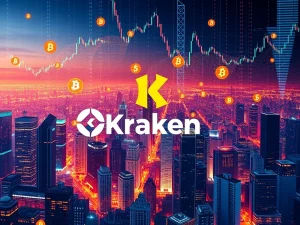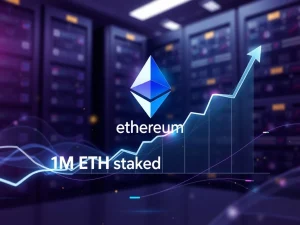Exciting LA Token Airdrop Announced by Lagrange Labs

[ad_1]
BitcoinWorld

Exciting LA Token Airdrop Announced by Lagrange Labs
Are you ready for a potential new opportunity in the world of decentralized finance? The crypto space is buzzing with news about Lagrange Labs, a prominent player in the cross-chain infrastructure sector, and their upcoming utility token launch. Get ready, because the LA token is coming, and with it, an anticipated crypto airdrop.
What is Lagrange Labs and Why Does it Matter?
Lagrange Labs is building essential infrastructure designed to solve one of the biggest challenges in blockchain today: seamless and secure communication between different blockchain networks. Think of it as creating superhighways that allow data and assets to flow freely and reliably from one chain to another. This is crucial for the growth of decentralized applications (dApps) and the overall crypto ecosystem.
Their focus on cross-chain capabilities positions them at the forefront of blockchain interoperability. By enabling efficient communication, they aim to unlock new possibilities for developers and users alike, potentially leading to more complex and powerful dApps that aren’t limited to a single network.
The Arrival of the LA Token
After establishing a dedicated foundation to oversee its development and ecosystem growth, Lagrange Labs is now set to launch its own native utility token, the LA token. The introduction of a native token is a significant step for the project, often serving multiple purposes within the ecosystem.
Utility tokens like LA can be used for various functions, such as governance (allowing token holders to vote on project proposals), paying for services within the network, staking to secure the network or earn rewards, and potentially accessing exclusive features. The specific utilities for the LA token will be detailed further by Lagrange Labs, but its existence signifies a move towards a more decentralized and community-driven model for the project.
Get Ready for the Crypto Airdrop: How to Participate
Perhaps the most exciting news for many in the crypto community is the planned crypto airdrop for the LA token. Airdrops are a popular method for projects to distribute tokens to a wide audience, often rewarding early supporters, users of their testnet or platform, or simply active participants in the broader ecosystem.
According to recent reports, the registration window for the LA token airdrop is set to open soon. Mark your calendars:
Airdrop Registration Start: May 28th
Airdrop Registration End: June 2nd
This short registration window means interested individuals need to act relatively quickly once it opens. While the exact criteria for eligibility and the registration process details will be provided by Lagrange Labs, typically, participants may need to connect their wallets, complete certain verification steps, or demonstrate prior interaction with the project’s testnet or related activities. Always ensure you are visiting the official Lagrange Labs website or communication channels for accurate instructions to avoid scams.
Understanding LA Tokenomics: Supply and Allocation
A crucial aspect of any token launch is its tokenomics – the economic model governing the token’s supply, distribution, and utility. Understanding tokenomics provides insight into the project’s long-term vision and how the token is intended to function within its ecosystem.
For the LA token, Lagrange Labs has outlined a clear distribution plan:
Total Supply Cap: 1 Billion LA tokens
The allocation of this total supply is as follows:
Community: 34.8%
Early Contributors: 25.4%
Investors: 18.5%
Foundation: 11.3%
Initial Airdrop: 10%
This allocation structure shows a significant portion dedicated to the community and the initial airdrop, which is often seen as a positive sign for decentralization and broad distribution. The allocation to early contributors and investors is standard for projects that have undergone funding rounds, while the foundation’s share is typically used for ecosystem development, grants, and ongoing operations.
What Does the $17 Million Funding Mean?
It’s worth noting that Lagrange Labs secured a substantial $17 million in investment last year. This significant funding round demonstrates strong investor confidence in their vision for cross-chain infrastructure and their ability to execute on their roadmap. Such funding is essential for building complex technology, hiring talent, and expanding the project’s reach.
The successful funding round likely played a key role in enabling the project to reach this stage, including the development necessary for the LA token launch and the subsequent airdrop. It provides resources to continue building robust and secure cross-chain solutions.
Why Airdrops Are Exciting for the Community
A crypto airdrop like the one planned by Lagrange Labs serves multiple purposes. For the project, it helps to decentralize token ownership, generate excitement and awareness, and potentially attract new users to their platform or technology. For participants, it offers an opportunity to receive free tokens, becoming early holders and stakeholders in the project’s success.
Participating in airdrops can be a way to get involved with promising projects early on. However, it’s always important to do your own research (DYOR) and be cautious of scams. Only use official links provided by Lagrange Labs.
Actionable Steps: Preparing for the Airdrop
If you’re interested in the LA token airdrop, here are some actionable steps you can take:
Monitor Official Channels: Follow Lagrange Labs on their official social media (like Twitter/X), Discord, and check their official website regularly for the precise airdrop registration link and detailed instructions.
Prepare Your Wallet: Ensure you have a compatible cryptocurrency wallet ready. MetaMask or similar EVM-compatible wallets are often used for airdrops on networks like Ethereum or Layer 2s, which are common for infrastructure projects.
Understand the Criteria: Once released, carefully read the eligibility criteria. Did you use their testnet? Participate in previous campaigns? These factors often determine eligibility.
Be Mindful of Security: Never share your private keys or seed phrase. Be wary of phishing attempts and fake websites. Only interact with official sources.
Note the Dates: Remember the May 28th to June 2nd registration window. Don’t miss it!
Conclusion: A New Chapter for Lagrange Labs and Cross-Chain Infrastructure
The launch of the LA token and the accompanying crypto airdrop mark a significant milestone for Lagrange Labs. As they continue to build vital cross-chain infrastructure, the introduction of a native token with a clear tokenomics structure and a community-focused distribution plan via an airdrop signals their commitment to growth and decentralization. This is an exciting development for anyone interested in the future of interoperability and the potential opportunities within the crypto space.
To learn more about the latest crypto airdrop opportunities and cross-chain infrastructure trends, explore our articles on key developments shaping the future of decentralized finance.
This post Exciting LA Token Airdrop Announced by Lagrange Labs first appeared on BitcoinWorld and is written by Editorial Team
[ad_2]
Source link









